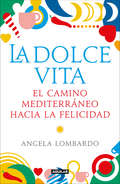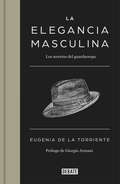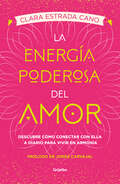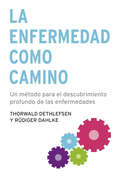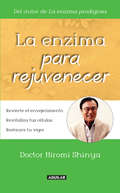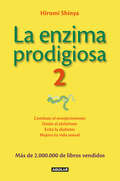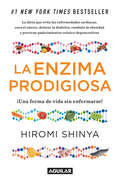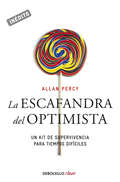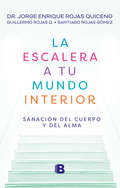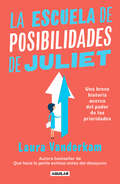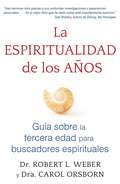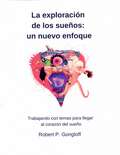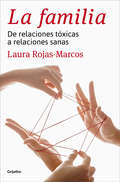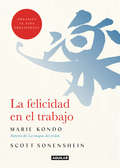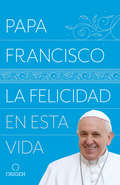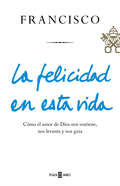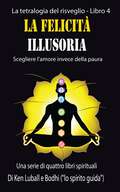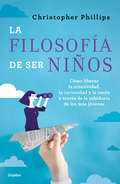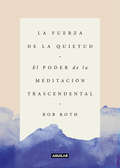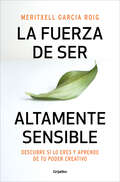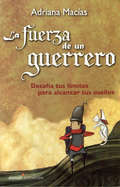- Table View
- List View
La dolce vita: El camino mediterráneo hacia la felicidad
by Ángela LombardoEl camino mediterraneo hacia la felicidad 15 ejercicios para la vida de hoy ¿Qué significa en la actualidad carpe diem? ¿Cuántas veces hemos pospuesto una ocasión de ser felices? ¿Y si hoy fuera el momento adecuado para concedernos el derecho a tener la vida que deseamos? Este es precisamente el contenido del mensaje de Epicuro, el maestro fundador de la única escuela que tenía como materia principal de enseñanza la alegría de vivir. Para conquistar esta alegría, fundada en la amistad, en el goce de los placeres más auténticos y en la capacidad de aprender a elegir lo que nos hace sentir mejor, no hay que esforzarse ni alterar nuestra vida: bastan unos cuantos ejercicios sencillos, aunque no banales, como mirar a la cara a las estrellas, ofrecer un café a nuestro vecino o aprender a ser desobedientes. Gracias a este libro descubriremos los secretos de la sabiduría mediterránea, que siempre han estado en nuestro adn cultural y que con frecuencia nuestra vida frenética nos hace olvidar. ¿Cómo podemos descubrir los secretos del arte de la alegría que pertenece desde siempre a la cultura mediterránea? ¿Qué puede decirnos a cada uno de nosotros una carta sobre la felicidad que fue escrita en un jardín ateniense en el siglo IV a.C.? La dolce vita acompaña a los lectores en un viaje imprevisible donde descubrirán la irónica sabiduría de Epicuro, la poderosa elegancia de Lucrecio y la comicidad de Horacio, que resplandecen en una nueva traducción capaz de devolverles una voz fresca y viva. La autora hace dialogar a los maestros antiguos con la realidad contemporánea y con amigos viejos y nuevos --como Homero, Peggy Guggenheim, Hugh Grant, Arthur Rimbaud y la abuela de Jay-Z--, que nos enseñan a desechar los pensamientos inútiles para saborear la poesía de la vida. «Ni hedonistas ni ascetas, nosotros, losalumnos epicúreos del siglo xxi somos libres de tomar todo el pan y las rosas que necesitamos para nutrir el cuerpo y el espíritu con amor, respeto y moderación».
La elegancia masculina: Los secretos del guardarropa
by Eugenia De la TorrienteUna guía de referencia sobre elegancia masculina ¿Qué diferencia hay entre un frac y un chaqué?¿Cuándo y dónde se perdió el hábito de llevar sombrero a diario?¿Cómo consiguieron las zapatillas saltar de las canchas deportivas a los despachos? Para responder a estas y otras muchas preguntas, una guía definitiva de la elegancia masculina que combina el análisis de la evolución histórica del vestir, las anécdotas y la información práctica. La estructura parte de cuatro grandes bloques (sastrería, deportivo, complementos y zapatos) que son presentados con una introducción y una imagen histórica para después desglosarse en apartados específicos, solo aparentemente enciclopédicos, para cada una de las prendas más significativas. La guía, elegantemente ilustrada, tiene una voluntad atemporal y trasciende de las tendencias del momento para convertirse en una referencia clásica a la vez queamena. «Sea tu vestido tan costoso cuanto tus facultades lo permitan; pero no afectado en su hechura, rico, no extravagante, porque el traje dice por lo común quién es el sujeto, y los caballeros y principales señores franceses tienen el gusto muy delicado en esta materia.»Shakespeare, Hamlet
La energía poderosa del amor: Descubre comó conectarcon ella a diario para vivir en armonía
by Clara Estrada"Estas páginas son una invitación a vivir amándonos y amando. Llevan implícita la revelación de la energía del amor como la gran corriente que mueve la evolución de toda la comunidad viviente". Doctor Jorge Carvajal Después de enfrentar dos diagnósticos fatales, Clara Estrada entendió que el amor y su poder infinito fueron determinantes para superar con éxito las dificultades que la estaban desafiando. En su segundo libro nos enseña que el amor propio es un estado del alma: no está determinado por el cuerpo, si está o no en perfecto estado, e incluye no solo lo bueno, sino también los dolores, desencuentros, fracasos, tristezas, heridas y frustraciones. Debería ser tan importante como respirar, porque de ahí parten todos los demás: el amor a la pareja, a los padres, a los hijos, a los amigos, al trabajo, a la naturaleza. En estas páginas encontrarás las herramientas para usar esa poderosa energía que tienes dentro de ti.
La enfermedad como camino: Un método para el descubrimiento profundo de las enfermedades
by Thorwald DethlefsenLa enfermedad como camino analiza el significado de los quebrantos de salud más habituales. No hay una diversidad de enfermedades curables, sino una sola enfermedad determinante del «mal estar» del individuo. Lo que llamamos enfermedades son en realidad síntomas de esta única enfermedad.Este libro analiza el significado de las infecciones, los dolores de cabeza, los trastornos cardíacos y los quebrantos de salud más habituales. Todos los síntomas tienen un sentido profundo para la vida de la persona: nos transmiten mensajes del ámbito espiritual, y de su adecuada interpretación dependerá nuestra capacidad de recuperarnos. Se incluye un capítulo especial dedicado al problema del sida, así como un índice de enfermedades y una relación de las partes y los órganos del cuerpo con sus atributos psíquicos.
La enzima para rejuvenecer: Revierte el envejecimiento. Revitaliza tus células. Restaura tu vigor
by Hiromi ShinyaUno de los grandes deseos del ser humano es mantenerse joven, sano y lleno de energía. Gracias a los estudios del doctor Shinya, este anhelo está muy cerca de convertirse en una realidad. Una vez más el doctor Hiromi Shinya, autor de La enzima prodigiosa, cambia por completo nuestra percepción de lo que es posible respecto a la salud con su nuevo libro La enzima para rejuvenecer. Con La enzima para rejuvenecer el doctor Hiromi Shinya cambia por completo nuestra percepción de la salud una vez más. En esta obra, el doctor Shinya enfoca su talento visionario a solucionar el problema de las células del envejecimiento y sus conclusiones resultan verdaderamente impactantes. En este libro aprenderás: o Cómo las enzimas de rejuvenecimiento transforman las células zombi en células sanas. o Cómo puedes restablecer tu energía limpiando tus células de "basura". o Por qué los alimentos morados mejoran tu memoria. o Por qué tomar agua de Kangen contribuye a tu salud y energía. o Por qué la cúrcuma previene la enfermedad de Alzheimer. Uno de los grandes deseos del ser humano es mantenerse joven, lozano y lleno de energía. Gracias a los estudios del doctor Shinya y al plan de rejuvenecimiento que nos ofrece aquí, este anhelo está muy cerca de convertirse en una realidad. La crítica ha opinado: "El doctor Hiromi Shinya logró un avance impactante y vanguardista en el campo de la cirugía abdominal (además de la coinvención de la colonoscopia) que dio lugar a un cambio radical en el pensamiento médico" -The New York Times-
La enzima prodigiosa 2
by Hiromi ShinyaIn The Enzyme Factor 2 Dr Hiromi Shinya again turns his visionary genius to the power of enzymes to cure and restore. He provides compelling evidence for ways to obtain a healthy heart and youthful body. In Enzyme Factor 2 Dr Shinya tells how to reverse again, stop Alzheimers, and prevent diabetes. He explains how to rejuvenate your sex life naturally.
La enzima prodigiosa: Una forma de vida sin enfermar (La enzima prodigiosa #Volumen 1)
by Hiromi ShinyaEl doctor Hiromi Shinya te enseñará cómo conservar el abastecimiento de las enzimas prodigiosas y revertir procesos degenerativos para fortalecer tus enzimas corporales y así gozar de buena salud hasta una edad avanzada. La dieta del futuro que evitará enfermedades cardiacas, curará el cáncer, detendrá la diabetes tipo 2, combatirá la obesidad y prevendrá padecimientos crónico degenerativos. Más de dos millones de libros vendidos. De acuerdo con el doctor Hiromi Shinya "tu cuerpo está diseñado para curarse a sí mismo"; la dieta que él propone ha curado a miles de pacientes sin recaídas. Cualquier persona, con independencia de su predisposición genética, puede ayudar a su cuerpo a evitar enfermedades cardiacas, obesidad, fibromas, estreñimiento, síndrome de colon irritable, enfermedad de Crohn, apnea del sueño y enfermedades autoinmunes. La clave está en el factor enzimático. Las enzimas son proteínas complejas que permiten el desarrollo de todas las funciones celulares. La enzima prodigiosa revolucionará tu forma de ver el cuerpo humano, la medicina y la salud. Explica por qué alimentos considerados saludables como los lácteos son la causa de enfermedades crónicas. Detalla los procesos de destrucción enzimática generados por el alcohol, el tabaco y las grasas trans. Al cambiar pequeños hábitos hoy tendrás buena salud siempre.
La escafandra del optimista: Un kit de supervivencia para tiempos difíciles (Genios para la vida cotidiana #Volumen)
by Allan PercyEn La escafandra del optimista, de la serie «Genios para la vida cotidiana», el prestigioso Allan Percy nos proporciona las herramientas para encarar la vida con energía positiva y vencer al pesimismo. Los optimistas poseen un blindaje especial que los protege contra las dificultades: con la serenidad que proporciona una inmersión en el silencio del océano, quien piensa en positivo es capaz de actuar al margen del desánimo y de encontrar soluciones en aguas revueltas. Este libro explica cómo adquirir ese blindaje, la escafandra del optimista, además de procurar al lector un «kit de supervivencia» en el que se incluyen los siguientes instrumentos: - Un antídoto para cada idea pesimista, a la cual se antepone una idea optimista para afrontar la situación. - Una galería de personajes que demuestran con su ejemplo cómo una actitud positiva rompe todas las barreras. - Consejos y estrategias para ver el vaso «medio lleno» y llenar incluso la otra mitad. - Un anexo sobre las endorfinas, la nieve de San Juan y otros amigos del optimismo.
La escalera a tu mundo interior: Sanación del cuerpo y del alma
by Jorge Enrique Rojas Santiago Rojas Gómez Guillermo Rojas QuicenoUna guía para lograr la sanación del alma y del cuerpo. En las consultas médicas que realizan los autores de este libro, se han dado cuenta de que no todas las enfermedades que aquejan a los seres humanos son del cuerpo, sino que también hay algunas que son expresiones de un desequilibrio espiritual y no se pueden curar con procedimientos tradicionales. Para tratar estos males, debemos hacer un trabajo interno de reflexión y meditación con el fin de comprender qué los está causando y cómo podemos sanarlos de raíz. La escalera a tu mundo interior nos propone entonces un viaje espiritual hacia el autoconocimiento y la sabiduría, a través de siete escalones -siete capítulos- en los que tendremos que enfrentarnos a nosotros mismos, y a todo tipo de obstáculos externos, si queremos experimentar la paz interior que nos llevará al verdadero bienestar. En cada escalón podremos conocer nuestras virtudes y cualidades, o nuestros vicios y pasiones; todo depende de cómo decidamos abordar este recorrido por las emociones, el miedo, la consciencia, el ego, la mente, la liberación y, en últimas, la sanación.
La escuela de posibilidades de Juliet: Una breve historia acerca del poder de las prioridades
by Laura VanderkamUna fábula encantadora que cambiará tu vida y te ayudará a repensar tu enfoque sobre el tiempo, las prioridades y las posibilidades. Riley Jenkins es una consultora ambiciosa y trabajadora de veintinueve años que está acostumbrada a toda una vida de evaluaciones casi perfectas, hasta que recibe una terrible evaluación de desempeño de su jefe. ¿Cómo es eso posible cuando Riley hace todo lo que sus clientes quieren, incluso responde a sus correos electrónicos las 24 horas del día, los 7 días de la semana, más rápido de lo que esperan? A pesar de sus horas de locura y atención a los detalles, Riley no puede producir el trabajo atento que sus clientes esperan, y ahora tiene treinta días para dar resultados y cerrar un trato importante, o la despiden. Mientras tanto, su vida personal también está al borde del desastre, y su novio y amigos cercanos pierden la paciencia con su falta crónica de disponibilidad. Lo último que Riley quiere, en un momentotan estresante como éste, es asistir a un retiro de liderazgo para mujeres de su empresa en un lugar llamado La escuela de posibilidades de Juliet. Sin embargo, en poco tiempo, Riley se encuentra intrigada por Juliet, la experta en estilo de vida que organiza el retiro. ¿Cómo es que una madre soltera de dos hijas dirige un negocio exitoso mientras actúa como si tuviera todo el tiempo del mundo? La respuesta puede estar en una de las frases de Juliet: "Las expectativas son infinitas. El tiempo es finito. Siempre estás eligiendo. Elige bien." Al final de esta historia, te unirás a Riley para repensar el equilibrio entre tu presente y tu futuro, entre las cosas que debes hacer y las cosas que quieres hacer. Al igual que Riley, puedes liberarte de sentirte abrumado y perseguir tus mayores posibilidades.
La espiritualidad de los años: Guía sobre la tercera edad para buscadores espirituales
by Carol Orsborn Robert L. WeberUna guía compasiva para transformar el envejecimiento en crecimiento espiritual • Ofrece al lector veinticinco preguntas clave que le servirán como guía para acceder a fuentes de inspiración y valor que antes desconocía • Nos invita a encontrar un papel constructivo para la vergüenza y el arrepentimiento y aceptar la libertad de buscar un camino que sea verdaderamente nuestro Cuando rebasamos los años de la mediana edad, nuestro deseo de encontrar una manera adecuada de abordar el envejecimiento cobra mayor urgencia y pertinencia en nuestras vidas cotidianas. Los autores Robert Weber y Carol Orsborn ofrecen a una nueva generación de buscadores espirituales la posibilidad de ver el envejecimiento como un sendero espiritual y revelan que la única manera de seguir creciendo como personas consiste en afrontar de una vez las difíciles interrogantes que nos plantean los temas de la pérdida de seres queridos, el significado de la vida y la mortalidad. La realización del potencial espiritual no se alcanza esquivando las dificultades que acompañan al envejecimiento, sino trabajando para superarlas. Los autores analizan cómo pasar de los temores sobre el envejecimiento hacia una apreciación más plena de la próxima fase de la vida, basados en veinticinco preguntas que nos ayudan a aceptar el lado sombrío del envejecimiento y las oportunidades espirituales que entraña. Comparten sus experiencias para enseñarnos lo que significa sentirnos llenos de energías en cuanto a las posibilidades de la edad madura. Analizan cómo hallar un papel constructivo para el arrepentimiento, la vergüenza y el sentimiento de culpabilidad, encontrar nuestro justo valor para la sociedad y aceptar la libertad de buscar un camino que sea verdaderamente nuestro. Weber tuvo una formación católica jesuita y Orsborn proviene de un contexto judío. Basados en las más recientes investigaciones en teoría psicológica y religiosa, dan sus propias respuestas francas a las veinticinco preguntas, y respaldan su sabia orientación con anécdotas, lecturas inspiradoras y ejercicios espirituales. Al trabajar profundamente con el lado sombrío y el lado luminoso del envejecimiento, no solo aprendemos a hacer frente a las situaciones, sino a dejar que nuestro espíritu alce vuelo.
La exploración de los sueños: Trabajando con temas para llegar al corazón del sueño
by Robert P GongloffSi bien la mayoría de los libros sobre sueños se enfocan en el simbolismo, «La exploración de los sueños» ayuda a profundizar explorando los temas que se presentan en los sueños y su relación con la vida de vigilia. Escrito como una guía práctica, este libro, el primero de este tipo, ofrece un programa de doce pasos que ayuda a identificar los temas centrales de la vida. También incluye una Matriz de temas que ofrece pasos prácticos, a la que se puede incorporar el conocimiento de los sueños personales en la vida cotidiana.
La familia y el dinero ¡Hecho fácil! (Family and Money, Made Easy!)
by Elaine KingLa familia y el dinero ¡Hecho fácil! es para toda la familia y, especialmente, para el joven adulto que siente curiosidad por la vida, más allá del dinero, y que aprecia las ideas y pensamientos que lo puedan ayudar a descubrir su motor financiero. Se diseño con la esperanza de que todos podamos partir de la misma base cuando observemos nuestras propias reacciones y tengamos una mejor comprensión sobre el papel de nuestra familia en nuestro comportamiento respecto del dinero. Se dice que para llegar a la luna hubo cuatro misiones y cada una de ellas fue necesaria para llegar a la meta. De manera similar, para poder alcanzar la meta de la independencia financiera, tendrás que saber cómo planificar, cómo ahorrar controlando las deudas, cómo invertir lo que ganas y cómo compartir con la comunidad. Para esto, cada capítulo describirá las estrategias, compartirá historias y te dará una tarea para que la apliques con la familia. ¿Empezamos? ¡Aprende divirtiéndote!
La familia: De relaciones tóxicas a relaciones sanas
by Laura Rojas-MarcosVivir plenamente en familia es un proceso que todos podemos aprender y llevar a la práctica. Para la mayoría de las personas todo sucede y se experimenta por primera vez en la familia: las primeras emociones positivas y negativas, los primeros aprendizajes y las primeras relaciones afectivas. Es en el entorno familiar donde recibimos las primeras lecciones sobre la vida y donde surgen también los primeros sentimientos de inseguridad y de desprotección así como aquellas emociones relacionadas con el rechazo. Todos tenemos una familia y no podemos elegirla. Sin embargo, sí podemos elegir, en mayor o menor grado, el tipo de relación que queremos tener con cada uno de los miembros que la componen. Como seres humanos, tenemos la capacidad de desarrollar habilidades para tratar y protegernos de aquellos familiares a quienes podemos considerar «tóxicos», incluso los más cercanos con los que sentimos que no tenemos nada en común o los que nos causan estrés o sencillamente no nos gusta su manera de ser. Laura Rojas-Marcos nos propone un recorrido fácil para conseguir disfrutar de unas relaciones familiares sanas, algo esencial para alcanzar nuestra propia estabilidad emocional.
La fe en la vida
by Asma ElferkoussTe invito a hacer un viaje por los capítulos para honrar la Vida, apreciar sus signos y tomar el tiempo de acoger lo que esta energía nos transmite. Te invito a través de "La fe en la vida" a descubrir recursos inspirados en nuestra vida cotidiana para divertirnos en diferentes áreas que nos preocupan a todos y recibir los mensajes que necesitamos en el momento adecuado. Te invito a encarnar tu verdad, a sumergirte en el corazón de ti mismo y dejarse ser... simplemente.
La felicidad en el trabajo
by Marie Kondo Scott SonensheinTU LUGAR DE TRABAJO ES MÁS IMPORTANTE QUE NUNCA. APRENDE CON MARIE KONDO A SACARLE EL MÁXIMO PARTIDO Y MEJORAR TU VIDA. El puesto de trabajo es un imán para el desorden y el caos. ¿Quién no se ha sentido agotado por reuniones improductivas, papeles revueltos, interminables correos electrónicos y tareas innecesarias? Todo esto consume tu motivación, limita tus posibilidades de progreso y socava tubienestar. La felicidad en el trabajo aplica el famoso método KonMari al espacio donde ejerces tu actividad laboral. Ofrece historias, consejos prácticos y estrategias para eliminar el desorden en el lugar donde trabajas y disfrutar de la productividad, el éxito y la felicidad que conllevan un entorno laboral y una mente ordenados. Los autores te guían mientras organizas tu vida laboral, ayudándote a desarrollar la confianza, a aumentar el éxito profesional y, por supuesto, a generar alegría.
La felicidad en esta vida
by Papa FranciscoUna colección de homilías, discursos y "mensajes del día" que reúne la sabiduría del papa Francisco para encontrar la felicidad en el presente. Para el papa Francisco, el aprecio por nuestra vida cotidiana es un compromiso espiritual. <P><P> La alegría es un atributo divino, y crear alegría a nuestro alrededor es una parte esencial de la fe. Cada homilía y discurso de este libro, escrito en un lenguaje cálido, atractivo y accesible tanto para creyentes como para no creyentes, ofrece una lección clave que guía a los lectores a encontrar el amor y la felicidad en un mundo caótico. <P>En este libro, el papa Francisco reflexiona sobre la dignidad de la mujer y sus derechos, habla sobre cómo el amor al deporte puede sacar a relucir nuestras mejores cualidades y explica por qué luchar contra la discriminación es la esencia para amar a tu prójimo. <P> Además, comparte historias personales y anécdotas de su vida, nos da mensajes reconfortantes de esperanza y nos comparte cómo los problemas familiares pueden hacer de nosotros mejores personas.
La felicidad en esta vida: Cómo el amor de Dios nos sostiene, nos levanta y nos guía
by Jorge BergoglioUna colección de homilías y discursos que reúne la sabiduría del papa Francisco para encontrar la felicidad. «La felicidad no se compra. Y si lo haces, acabas dándote cuenta de que en realidad se ha esfumado.Sean capaces de buscar la verdadera felicidad.»FRANCISCUS «Todas las personas de todos los tiempos y de cualquier edad buscan la felicidad. Dios ha puesto en el corazón del hombre y de la mujer un profundo anhelo de felicidad, de plenitud. ¿No notan que sus corazones están inquietos y en continua búsqueda de un bien que pueda saciar su sed de infinito?» Para el papa Francisco, el aprecio por nuestra existencia cotidiana es un compromiso espiritual. La alegría es un atributo divino, y crearla a nuestro alrededor es una parte esencial de la fe. Cada homilía y discurso de este libro, escrito en un lenguaje cálido y accesible, es una lección de vida que guiará a los lectores en la búsqueda del amor y la felicidad en este mundo tan caótico. En esta recopilación de enseñanzas, el papa Francisco reflexiona sobre la dignidad de la mujer y sus derechos, habla sobre cómo el amor al deporte puede sacar lo mejor de cada uno y explica por qué luchar contra la discriminación es clave para amar al prójimo. Además, comparte historias personales y anécdotas de su vida, nos da mensajes reconfortantes de esperanza y expone cómo los problemas familiares pueden hacer de nosotros mejores personas. En definitiva, el pontífice traza en este libro el camino de la auténtica autorrealización y alegría.
La felicidad personal
by Antoni BolinchesLa felicidad no es algo que puedan darnos los demás. Únicamente quien es capaz de aceptarse y quererse está en condiciones de propiciar su felicidad y compartirla. Este libro propone pautas para realizar una transformación interior que permita vivir de acuerdo con uno mismo, construir una relación amorosa armónica y desarrollar al máximo el propio potencial. El camino de la autosuperación que este proceso abre ante nosotros nos conducirá hacia la felicidad. Quien esté dispuesto a aprender de sus errores y considere que la felicidad depende más de sus actitudes que de sus circunstancias concretas, encontrará en este manual una guía útil para alcanzar la felicidad personal.
La felicidad personal: Claves para un cambio interior
by Antoni BolinchesEste libro propone pautas para realizar una transformación interior que permita vivir de acuerdo con uno mismo y propicie la consecución de la felicidad personal. La felicidad no es algo que puedan darnos los demás. Únicamente quien sea capaz de aceptarse y quererse estará en condiciones de propiciar su felicidad y compartirla. Este libro propone pautas para realizar una transformación interior amorosa armónica y desarrollar al máximo el propio potencial. El camino de auto superación que este proceso abre ante nosotros nos conducirá hacia la felicidad. Quien esté dispuesto a aprender de sus errores y considere que la felicidad depende más de sus actitudes que de sus circunstancias concretas, encontrará en este manual una guía útil para alcanzar la felicidad personal.
La felicità illusoria
by Ken Luball"Chi guarda fuori, sogna. Chi guarda dentro, si sveglia." -Carlo Jung Quando la tua relazione con il mondo intorno a te si forma attraverso una lente dominata dalla paura, il tuo Viaggio attraverso la vita può spesso sembrare solitario e opprimente. I tuoi guai sono infiniti e il tuo bagaglio pesante, il che spesso ti porta a erigere barriere interne, proteggendoti da questo trauma emotivo. Eppure queste stesse barriere servono anche a isolarci da tutto ciò che ci circonda, compreso il nostro vero io. L'illusione della felicità; scegliere l'amore anziché la paura è il quarto libro della "tetralogia del risveglio" e rivela i falsi percorsi su cui spesso ci troviamo e come è possibile ritrovare la pace interiore e il proprio scopo. Impara come smettere di cercare Significato e Felicità attraverso attività e relazioni esterne e, invece, concentrati sul disfare il tuo trauma e trovare la tua Luce interiore.
La filosofía de ser niños
by Christopher PhillipsCómo liberar la creatividad, la curiosidad y la razón a través de la sabiduría de los más jóvenes. La niñez es nuestra plataforma de despegue, el periodo de la vida en el que el aprendizaje es más intenso, y adquirimos el conocimiento crítico y las habilidades que nos permitirán adaptarnos. Filósofos de todas las épocas han señalado que, con el paso del tiempo, los seres humanos tendemos a encogernos mental y emocionalmente. Desvirtuamos nuestra naturaleza -caracterizada por la curiosidad, la empatía, la razón, el asombro y el deseo de experimentar y entender- y, de esta manera, se va volviendo borroso nuestro sentido de identidad. Comenzamos nuestras vidas con un estallido moral, intelectual y creativo. Siguiendo las evidencias científicas que así lo demuestran, Christopher Phillips advierte que la niñez no es simplemente un estado de desarrollo, de transformación -de llegar a ser-, ni la adultez un momento de plenitud o acabamiento. Si aprovechamos las cualidades propias de la niñez, no estaremos condenados a volvernos seres desanimados y frágiles, sino que creceremos y viviremos guiados por el asombro, la curiosidad, la imaginación, el sentido de juego y la compasión. Explorando y explotando la filosofía de ser niños, podremos desarrollar ilimitadamente nuestro potencial. Vinculando filosofía, ciencias sociales, investigación neurocientífica y anécdotas personales, este libro propone una aproximación radicalmente distinta al tema de la frontera entre niñez y adultez, para mostrarnos que la forma como los niños ven y viven el mundo puede ser una clave para un desarrollo pleno, para alcanzar eso que los griegos llamaban areté o excelencia.
La fuerza de la quietud: El poder de la meditación trascendental
by Bob RothAprende qué es y cómo funciona la meditación trascendental, la mejor forma de combatir el estrés y conseguir un estado de relajación y descanso al que estamos predispuestos de forma natural. ¿Qué tienen en común Oprah Winfrey, Ellen DeGeneres, Gwyneth Paltrow, Tom Hanks o Gisele Bündchen? La respuesta es: un profesor de meditación trascendental llamado Bob Roth, que ha ayudado a miles de personas a desarrollar su creatividad y poder innatos a través de una técnica sencilla y no religiosa llamada meditación trascendental. En este libro Bob Roth nos explica, de forma simple y clara, todo lo necesario para conocer y practicar esta técnica. «La fuerza de la quietud es una clase magistral que hace la meditación trascendental accesible a todo el mundo».Arianna Huffington «Se duerme mejor. Se tienen mejores relaciones. Interactuamos mejor los unos con los otros. Estoy un mil por ciento mejor cuando la practico».Oprah Winfrey «La guía más simple, atractiva y fácil de entender sobre la meditación trascendental, una técnica en la que confío para ayudarme a llevar esta vida tan desafiante, a veces estresante».Gwyneth Paltrow Sus seguidores han dicho:«Mi mujer y yo admiramos a Bob. Ayudó mucho a nuestro hijo Oscar, que era un niño estresado y ansioso. Ahora lo veo florecer y controlar las cosas que lo hacen único».Hugh Jackman «Es el único momento en que tengo esa quietud. Me da sensación de paz. Simplemente me encanta».Ellen Degeneres «La meditación trascendental es muy fácil de aprender y muy sencilla de practicar. Sin embargo, lo que obtienes a cambio, el beneficio a lo largo de tu vida... eso lo cambia todo».Cameron Diaz «No puedo alabar lo bastante a Bob Roth y a la meditación trascendental. La quietud, la verdadera quietud, tanto de la mente como del cuerpo, es un regalo. La meditación trascendentalme enseñó cómo acceder a esa quietud y abrir ese regalo a diario».Michael J. Fox «La meditación trascendental es la razón más importante de cualquier éxito que haya tenido en mi vida. La fuerza de la quietud, de Bob Roth, destila de forma magistral la esencia de esta técnica para que cualquiera pueda entender cómo funciona, y por qué deberían aprenderla».Ray Dalio «Tengo mucha suerte de que Bob esté en nuestras vidas. La ansiedad es como una plaga familiar. ¡Provengo de una familia de mujeres judías neuróticas que necesitan meditación trascendental más que nadie! ».Lena Dunham «La belleza de la meditación trascendental reside en su indulgencia. No puedes hacerla mal».Robin Roberts «Cuanto más practicas la meditación trascendental, mejor te sientes y piensas: estoy a cargo de mi destino en este momento».Mario Batali
La fuerza de ser altamente sensible: Descubre si lo eres y aprende de tu poder creativo
by Meritxell Garcia¿Sabías que el 30% de la población es Persona Altamente Sensible (PAS)? Aprende claves y trucos para que este rasgo de la personalidad se convierta en un superpoder. ¿Tienes un olfato fino y oyes el mínimo ruido? ¿Te agobias en lugares con mucha gente? ¿Observas sutilezas que pasan desapercibidas para la mayoría? ¿Te molestan las etiquetas de la ropa?. Si has respondido afirmativamente, es posible que seas una persona altamente sensible (PAS): tu cableado neurológico es distinto, percibes más información que el resto de la gente a través de los sentidos, y muchas veces, este alud de estímulos te satura. Cuando entiendas cómo funciona tu maquinaria PAS, descubrirás que la alta sensibilidad puede jugar a tu favor si sabes cómo hacerlo. Este libro te enseña cómo sacar partido de tu naturaleza sensible y creativa, descubrir tu potencial y brillar y construir una vida plena acorde con tu personalidad.
La fuerza de un guerrero
by Adriana MacíasDesafía tus límites para alcanzar tus sueños. Adriana Macías entrega en este libro una historia emotiva e impactante. Sus personajes son guerreros discapacitados que deben enfrentar las fuerzas del mal que acechan a Villa Eclipse, su pueblo. Comandados por un niño valiente y decidido, nuestros héroes aprenden que todo en la vida se puede conseguir con amor, respeto, comprensión, lealtad y compañerismo. Sin duda una historia donde los valores humanos y la aceptación son esenciales para comprender la vida; para la autora no hay imposibles y cada nuevo reto es una opción para ser mejores. Desafía tus límites para alcanzar tus sueños. Adriana Macías entrega en este libro una historia emotiva e impactante. Sus personajes son guerreros discapacitados que deben enfrentar las fuerzas del mal que acechan a Villa Eclipse, su pueblo. Comandados por un niño valiente y decidido, nuestros héroes aprenden que todo en la vida se puede conseguir con amor, respeto, comprensión, lealtad y compañerismo. Sin duda una historia donde los valores humanos y la aceptación son esenciales para comprender la vida; para la autora no hay imposibles y cada nuevo reto es una opción para ser mejores.
